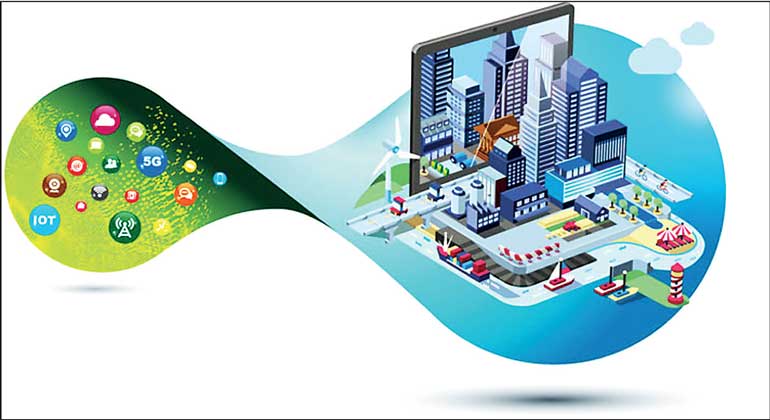Friday Feb 20, 2026
Friday Feb 20, 2026
Thursday, 2 September 2021 00:00 - - {{hitsCtrl.values.hits}}

 Embracing a vision to build a digital nation with enhanced economic vitality, robust social safety nets, and efficient and fair governance is a dream that Sri Lanka could accomplish one day.
Embracing a vision to build a digital nation with enhanced economic vitality, robust social safety nets, and efficient and fair governance is a dream that Sri Lanka could accomplish one day.
The success of digital nation initiatives depends heavily on having an open environment, especially the application of borderless technology, which means applying universal borderless technology and promoting the appropriate integration of international and local partners.
Experts in the subject of digital economic transformation highlights that when done correctly, digital nation becomes a part of the fabric of an economy, society and governance, and relies on technological capabilities and supporting policies. Sri Lanka too has the potential to open up value-driven growth in traditional industries via digital transformation and become a fully-fledged digital economy.
Importance and need for growth in ICT
Twenty years later by 2041, the people from this era will look back at their memories at the 2020-2021 period as the years that changed everything. In our known knowledge of the world, nowhere else on the earth, we live today in history have had witnessed the unprecedented and unforeseen growth arisen as in the digital and e-commerce sectors, which have boomed amidst a pandemic.
Although a challenging environment prevails with slowing economic activity across the globe, today we see that COVID-19 has led to a surge in e-commerce and accelerated digital transformation across economies. Whilst the lockdowns became the new normal, businesses and consumers increasingly “went digital”, providing and purchasing more goods and services online, raising e-commerce’s share of global retail trade from 14% in 2019 to about 17% in 2020, further growing in this year. According to global economic analysts, this figure is expected to reach 21.8% in 2024.
As people with talent and individuals involved in the ICT industries, it is important that we need to recognise the challenges and take steps to support governments and citizens as they continue to embrace new ways of working and engaging in economic activity. In today’s global digital economy, the importance of Information and Communication Technology (ICT) infrastructure, applications and services is growing at a faster rate.
Disruptive technologies such as artificial intelligence, self-driving cars, and robotics are increasingly being introduced. As a result, there is a need for new knowledge and skills. Support to countries and industry in their efforts to match current skills with the new jobs created, as a result of the rapid technological developments, has become a priority.
On the other hand, developing economies such as Sri Lanka, landlocked developing countries, and small island developing states continue to be facing connectivity challenges that encumber the delivery of the much-needed ICT training in the desired quality as and when it is needed. These connectivity challenges also result from limited human and financial resources, and the nonexistence of a conducive policy environment to support digital skills development.
Going digital has become the strategic high ground for governments around the world. In Today’s world, over 150 nations of the world’s countries have developed a national digital strategy. Globally, the first level of need is to deploy ICT infrastructure. This is the foundation of a digital economy. Therefore as a country, Sri Lanka must look at developing more skills and talent in the digital technology-based industries whilst enabling ICT sector investments in infrastructure.
A recent report published by global ICT giant Huawei and Oxford Economics points out that, digitalisation will produce a sustaining effect on the economy or the renowned ‘Digital Spillover’. According to the report specifically, for every one US dollar invested in the digital sector, GDP will grow by 20 fold. Further, Digitalisation will also facilitate the fulfilment of the UN’s SDGs.
Sri Lanka as a South Asian economy is somewhat a mature market in the telecom operator segment having witnessed a consolidation phase in both fixed and mobile telecommunications. The country had topped among the list that maintained the lowest mobile tariffs in Asia in the last decade. Since the mid of 1990’s populace had vastly adopted telecom technologies, whilst Sri Lanka is a proven case study to show that ‘Connection’ has become a human need, and the vector of human love, and the texture of the human future.
Way forward for Sri Lanka to be transformed into a digital economy
Research shows that the economy and society transform alongside ongoing digitalisation. Furthermore, digitalisation promotes an increase in economic efficiency in all industries, through the creation of new business models. In finance, traditional enterprises apply new digital technologies to enhance their competitive advantages. The convergence of finance and technology is also resulting in the emergence of a new wave of FinTech enterprises. In transportation, digitalisation has led to the new business model of ride-sharing.
At the same time, an Intelligent Transportation System (ITS) can effectively increase carrying capacity and speed, and lower the failure rate of infrastructure. In energy, smart grid technology is helping to optimise power generation, transmission, transformation, storage, distribution, and consumption. In manufacturing, traditional manufacturers are upgrading by digitalising technological processes, with many new product technologies emerging as a result.
Just nearly 15 years ago Sri Lanka was just a $ 25 billion economy, less than one-third of what is today. But since then with all stakeholders in the ICT industry and transformation had too played a significant role in Sri Lanka’s growth story to a $ 87 billion economy in less than a decade also contributing a huge revenue base to the government of Sri Lanka, and delivering larger realised Foreign Direct Investments to date from countries including China, Japan, Malaysia, Singapore, India and Saudi Arabia pouring millions of US Dollars to the Sri Lankan economy. As of now Sri Lanka’s active mobile connections had grown from just 5.4 million or 20% of penetration in 2005 to over 28 million or 131% mobile penetration.
More recently in June this year reports highlight that Sri Lanka’s apex body involved in ICT policy and direction have unveiled that ICTA’s vision is to see 300,000 IT professionals, 500 digitally empowered government Chief Innovation Officer’s (CIO) contributing to, and operating their digital infrastructure, while high levels of public sector and citizen literacy rates are achieved.
Accordingly, the ICTA targets significant usage of shared solutions and digital services by the end of 2024, which would vastly benefit the citizens of the country. From an industry perspective, Sri Lanka will enter the third wave of technology during the digital transformation, with 750 tech companies, 1,000 IT and IT infused startups and 500 other technology startups in place by 2024. Further ICTA has highlighted that they believe that this expansion would enable the industry to reach the $ 3 billion export revenue.
The Sri Lankan ICT sector serves a number of industry verticals with many companies with a highly skilled talent pool and the cost-effective operational ability makes Sri Lanka’s ICT Destination of Choice. Reports and analysis point out that the current ICT talent pool in Sri Lanka is said to be growing by 20% year on year, and they are highly adaptable, innovative, and conversant in English – the world’s predominant business language. In the social sphere of a country, digitalisation optimises resource allocation and improves lives.
Globally, intelligent health risk prevention, public medical resources sharing, facilitation of professional training, and collaborative operation of medical facilities will solve key pain points in the healthcare field. Other applications such as remote education, customised content, and virtual classrooms are alleviating difficulties previously faced in education. Concerning governance, digitalisation could improve government efficiency and urban administration.
Digitalisation will also assist in the realisation of interactive policy channels, self-service transactions, integrated data management, and reliable information encryption in order to improve government services. Digitalisation will also boost the formation of a new-era urban management system with self-adaptive environmental protection, independent emergency response, self-verifiable food traceability, and autonomous municipal regulations.
Therefore, if Sri Lanka is to reach full potential and acquire the benefits of the ICT industry in the country’s economic performance may need to accelerate digital innovation and take steps to continuous development of digital talent. This will in turn will attract more Foreign Direct Investments to the country to realise the full potential of a digital economy that’s driving the nation forward.
A recent position paper done by leading ICT company Huawei titled ‘Digital Nation: Stronger Economy, Better Society, Adept Governance’ suggests policy tools and 12 actions that governments can take during the process of digital transformation. I hope it will be helpful to policymakers and regulators in Sri Lanka too.
(The writer, PhD – Informatic, is currently working as a Senior Lecturer, Department of Information and Communication Technology, Faculty of Technology, University of Sri Jayewardenepura. He has done several number of research related to IT and written several IT related articles to publications.)